Guest blog from Moojan Asghari, Thousand Faces Co-founder and CEO
Thousand Faces is a reward-based crowdfunding platform powered by Partisia Blockchain. It aims to address funding gaps and support impact-driven female founders. With only 1.9% of venture capital funding allocated to all-female founding teams, there is a huge gender gap in funding.
While women currently make just 30% of climate-related decisions, they have proven to excel in building sustainable businesses, resulting in organizations led by women being 2.5 times more profitable. Recognizing the significance of funding more women and providing them with leadership opportunities, Thousand Faces seeks to democratize funding for women and minorities by offering both financial resources and a powerful network.
Driven by the frustration of limited funding and support for underrepresented groups, we embarked on a mission to leverage the principles of Web3, namely transparency, ownership, and decentralization, to serve both people and the planet. The lack of inclusivity in investment decisions, particularly regarding women and minority-led ventures, poses a significant challenge. Research shows that unconscious bias often leads investors to favor individuals who resemble themselves, perpetuating the underfunding of women and minorities. To address this issue, Thousand Faces turned to the powerful capabilities of Partisia Blockchain.
Partisia Blockchain introduces an innovative approach to tackle this problem through its zero-knowledge and voting mechanisms. Leveraging the secure content and zero-knowledge voting developed by Partisia Blockchain, Thousand Faces is building a decentralized autonomous organization (DAO). This empowers the creation of an inclusive and transparent voting system that ensures the active participation of a diverse community.
The voting system operates at two levels. Firstly, a diverse jury panel plays a crucial role in the initial voting stage, utilizing the zero-knowledge bootstrapping of Partisia Blockchain to ensure process security. Additionally, a committee-based second level of voting includes the entire community, consisting of token holders and NFT members. This approach guarantees that community members, who act as funders and supporters, have a voice in selecting projects and monitoring their progress.
Thousand Faces has already launched its first membership and NFT collection, available on the website for interested individuals to explore and apply for private sales. You can apply to join the Thousand Faces membership on the allowlist here. The platform has also established a dedicated member’s board and successfully completed its inaugural acceleration program for female founders. We received over 200 applications from nearly 80 countries, aligning with diverse UN Sustainable Development Goals (SDGs). From Kenya, Nigeria, Germany, Lebanon, Singapore, and the UK, six outstanding projects reached the final round. At the awards ceremony in April, the top three were granted US$30,000, with support from sponsors including Sandbox and the World of Women Foundation.
To stay updated on our latest developments and join us on our exciting journey, follow us on Twitter or visit our website. We’re excited to be part of the Partisia Blockchain ecosystem and are fully committed to transforming the inclusivity in the web3 space and beyond.
Website | Twitter | Linkedin | Telegram | Discord | Medium | Instagram
Guest blog from Mariia Kren, eTrusty Co-founder and CEO
Corruption represents a significant hindrance to both economic growth and human development. Among various processes, procurement is particularly susceptible to corrupt practices, leading to substantial financial losses estimated at around €400 billion per year in European public procurement.
Furthermore, the procurement market faces another challenge as it is expected to grow from US$12–US$13 trillion in the next five years to approximately US$16–US$19 trillion. As procurement costs rise, the need for tender sites to scale rapidly becomes increasingly important.
In our commitment to combat corruption, restore trust in procurement, and facilitate the scalability of procurement platforms, we are delighted to introduce eTrusty.
By implementing blockchain technology, eTrusty fosters transparency through a publicly accessible ledger, ensuring secure and transparent monitoring of transactions and information. Moreover, it provides a decentralized and immutable data state, ensuring the secure storage of data. These features effectively mitigate client distrust and significantly reduce the risks associated with technical fraud.
A pivotal aspect of our confidence in implementing eTrusty lies in our collaboration with Partisia Blockchain. By harnessing the power of Multiparty Computation (MPC) with Zero-Knowledge (ZK), eTrusty establishes customizable layers of privacy for various aspects of procurement, such as applicants, judges, and results. This robust privacy framework effectively combats human fraud, coercive practices, and bribery. To elevate the scalability of eTrusty, we have integrated Partisia’s groundbreaking solution, Bring Your Own Coin, to establish a cross-border solution. Furthermore, the architecture of eTrusty enables customization to cater to diverse procurement requirements.
Currently, we are diligently developing our smart contracts, user interface, and back-end prototype. Our Minimum Viable Product (MVP) is scheduled to be completed in the last quarter of 2023. This MVP will be a web application showcasing all the key features of our API, which we plan to seamlessly integrate into existing tender platforms in the future.
The mission undertaken by eTrusty is of utmost importance and highly relevant in the current business landscape, where accountability and transparency are increasingly demanded. We eagerly anticipate the continued evolution of eTrusty’s protocol and its meaningful contribution to the broader objective of cultivating a fairer and more sustainable global economy.
As proud members of the Partisia Blockchain ecosystem, we invite you to follow us on our journey to shape the future of procurement!
15 May 2023 — Today marks the launch of the Insights Network’s Parti.com, a unique platform that empowers creators with Web3 technology and cryptocurrency transactions for content monetization. This hub for creators provides unprecedented control over their creative output, while enabling them to earn revenue through self-hosted cryptocurrency. Parti.com is built on the open-source technology of Partisia Blockchain, renowned as the world’s first privacy-preserving, next-generation blockchain. It offers multi-network currency support and affordable transactions.
Parti.com, designed to be an inclusive platform, provides users with self-custody of their funds, ensuring complete ownership and control. The platform’s ease of use, facilitated by a straightforward account setup process via Discord or Twitter login, makes it accessible to both creators and consumers.
Parti.com simplifies the buying and selling process by completely removing third parties, such as traditional banks and other Web2 financial institutions, from the monetization process. This marks the first time that creators and content consumers can interact within a completely peer-to-peer network, without payment processors or middlemen holding user funds.
One of the key features of Parti.com is the ability to create and sell NFTs directly from creator profiles, simplifying the process of content monetization. The AI Zone helps new creators generate art rapidly; thereby, democratizing the digital art landscape.
Furthermore, Parti.com breaks new ground with its application of NFTs as utility tokens, granting access to exclusive content. This concept, known as “tokengating”, is set to change the way creators engage with their audiences, fostering deep, meaningful connections. An easy-to-understand use case could involve a content creator creating a pass with a maximum of 1,000 units sold. All holders of this NFT, upon signing into their platform with their wallet, are granted access to all of the creator’s private content available on their Parti.com channel. This process, completely automated by the blockchain, creates a direct, creator-to-user connection that surpasses anything the current market offers, be it Web2 or Web3. The platform also accommodates transactions with ETH in Metamask, providing users with the flexibility to transact in their preferred cryptocurrency.
To jumpstart the network, Parti.com offers the unique “Hall of Fame” (HOF) NFT pass. This limited NFT access pass grants users master access to the entire network, enabling the first users to buy into the entire network and never have to pay for content access again. Coupled with the platform’s low transaction fees, this feature is set to redefine the value proposition for content creators and consumers. In the future, if users wish to leave the network, they can always offer the pass for sale in the upcoming NFT marketplace.
Parti tokens function as the platform’s currency, which users can use for buying and selling. Creators incur a 0.1% platform fee when selling NFTs or content in Parti tokens, compared to a 5% fee when using ETH or USDC. Although this fee model is subject to change, there is currently no fee for creators for at least the next three months, serving as an incentive to join the network early.
In essence, Parti.com is more than just a platform — it is a revolution in the creator economy. It is dedicated to providing creators with the tools they need to thrive, while offering consumers a new way to interact with and support their favorite creators. As the digital landscape continues to evolve, Parti.com stands at the forefront, poised to transform the creator economy with the power of Web3.
About Parti.com: Parti.com is built by Insights Network, a web3 Company founded in 2017 and through multiple market cycles.
About Partisia Blockchain Foundation: Partisia Blockchain Foundation brings unparalleled opportunities by empowering privacy-preserving, interoperable and sustainable innovation for fairness and transparency. It fuels the most secure and efficient networks to solve global problems. Distilled with more than 30 years of rigorous research, Partisia™ Blockchain future-proofs solutions, solves tomorrow’s challenges by powering fair, secure, distribution of benefits. While preserving privacy and confidentiality, it brings accountable, transparent and decentralized governance. Learn more: www.PartisiaBlockchain.com
Website • Twitter • Discord • Telegram • LinkedIn • Facebook • Instagram • GitLab • Medium • YouTube
Guest blog from Vlad Chejkov, Blockchain-Ads Founder
As the founder of Blockchain-Ads, I am thrilled to be featured in the Ecosystem Spotlight, where we are shedding light on the revolutionary changes we are bringing to the Web3 industry.
Blockchain-Ads is specifically designed to bridge a gap in the market where Web3 brands struggle to reach their ideal customers. Traditional ad networks often restrict crypto-related promotions, and none of the crypto ad networks currently allow targeting based on users’ on-chain behaviour.
Blockchain-Ads platform offers Web3 brands the opportunity to connect with their target audiences efficiently and effectively, outperforming the competitors 10 to 1.
Our collaboration with Partisia Blockchain has been fundamental to our success. Their pioneering multiparty computation (MPC) and zero-knowledge (ZK) technologies serve as the backbone of our solution. They ensure user data is processed securely while facilitating targeted advertising. This approach respects user privacy and transforms the digital advertising landscape without revealing any underlying data or compromising user privacy.
Currently, we are at an exciting juncture. We are preparing to launch Partisia smart contracts on testnet in the first half of May. It is a crucial step that will help us refine our solution in a secure environment before launching on the mainnet.
As we forge ahead, our mission is clear: to disrupt the conventional, centralized advertising industry with a decentralized, privacy-preserving, and cost-effective solution. We aim to redefine privacy and user control in the digital advertising landscape, tailoring specifically to the needs of Web3 brands.
For more insights into our progress and to stay abreast of our exciting journey, follow us on Twitter or reach out through our website. We are proud to be part of the innovative Partisia Blockchain ecosystem and look forward to reshaping the future of privacy-preserving advertising in the Web3 space.
Guest blog from Gordon Povey CEO & Founder at Kin
Kin is a Web3 ad-free search engine built around community, transparency, and privacy. The prototype has been operational for over a year and on 1 May 2023 we launched the Kin beta https://searchkin.com.
Our aim is to be a disruptor and so we are highly differentiated from incumbent search engines like Google.
We are building a community of users that believe in Web3 principles. We use blockchain and a smart contract for transparency. We will use multiparty computation (MPC) technology to ensure maximum privacy for users at all times.
We have thrown out the traditional advertising business model where the user is the product to be sold to advertisers. Instead, we become a broker of both information and also online products.
So metaphorically, if you want to go to the library for information, we become your personal librarian and try to find exactly what you are looking for without trying to sell you anything or distract you along the way. Then, if you do want to go to the shopping mall (metaphorically) to buy something, we are like your personal shopper trying to find exactly what you want and can even uncover local or artisan products that are usually difficult to find online.
We generate revenue as a broker only when we find what you really want. By taking this approach, we find information that is less skewed by large commercial SEO budgets, and we can discover online products that are often hidden by advertising and brand dominance.
We knew we needed to work with a Layer 1 blockchain so that we could mint our own tokens. We also knew that we needed a secure way to process user data while maintaining complete privacy. The fact that Partisia Blockchain was offering not just a blockchain, but also MPC capabilities made it a front runner.
We have just launched the Kin beta. The organic search (for web, news, images and videos) is working extremely well. We believe it provides better results than the incumbent search engines (try it for yourself and compare our results to other search engines).
We still have work to do on the shopping searches, which are limited and UK-centric at present. We will also be turning on the user rewards system very soon. To fund future developments, we are opening another token pre-sale, which will allow early supporters of our project to buy tokens at a discounted price. The funds will be used for the product launch and marketing, and for ongoing developments such as the implementation of our community-based training (using xAI methods) which is included in a patent we recently had granted.
Learn more about us: Search engine, Website, Email, Telegram, Twitter, LinkedIn
Most may not know, but generating random numbers is hard. It is quite surprising because many people will think, “well, I can just come up with a random number off the top of my head!” However, randomly coming up with a number in your head, as well as other solutions to generate random numbers has fundamental flaws. And this is a big problem. Generating a fair unbiased random number is critical. In fact, random number generators are used everywhere.
The first place many would think of random numbers being useful is in games of chance. But would you be surprised if you knew that reading this article required the use of a random number generator? The website hosting this article is protected by a cryptographic key, which relies on generating a random set of values to be used for the encryption key.
Generating numbers at random is difficult. At a high level, there are two main issues with generating random numbers: predictability and bias/corruption issues.

The predictability issue for RNG can be seen in both human- and machine-generated random numbers. For example, there is a famous problem called Benford’s Law that states any random number that someone thinks about has a 30% chance of starting with the number 1. When you want to have a chance of a number being generated to be equal in percentage, then this becomes a problem. If you use a computer program to generate random numbers, you are using a structured code. This means, after multiple iterations, someone can reverse engineer the numbers to find the pattern and predict what the next number could be, especially if the code being used is weak.
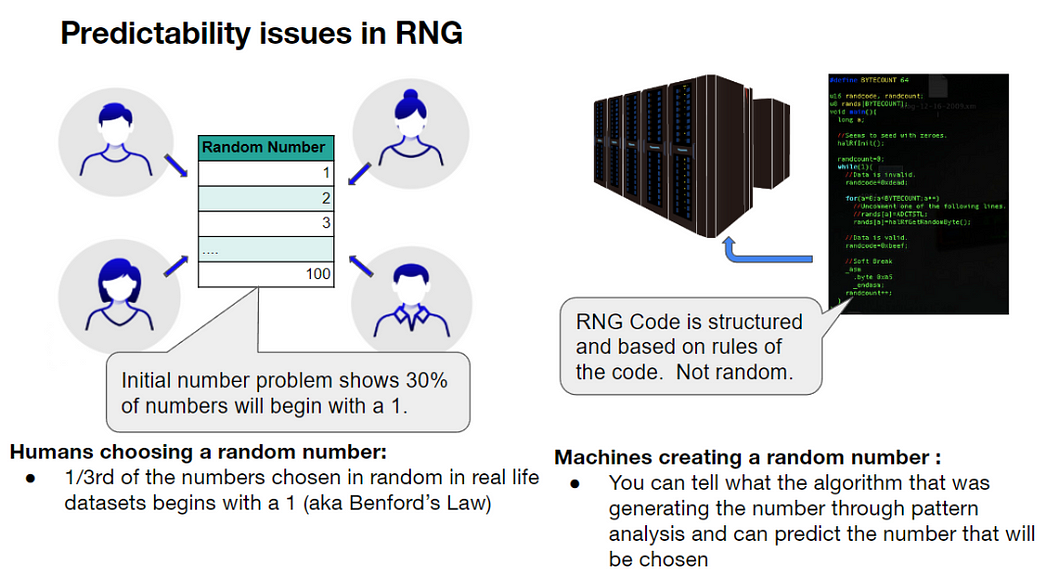
From a bias and corruption perspective, the current systems can also be gamed to give favor to someone. For instance, if a set group of people decide they will choose random numbers and run through some function to compute a random number, one person may withhold showing their number until they see what the other people have chosen. Then, once he knows the numbers of the other participants, he can choose a number that would compute the random number to his favor. From a machine generated random numbers, since most systems have a central system that is generating the numbers, anyone who has control of that system could also manipulate the numbers being generated to their favor.

So how can we create a system where it is both unpredictable and bias free? Through MPC and Partisia Blockchain, we can solve both problems. Through smart contracts, players in the system generate a random number. This random number is then privatized and sent into the PBC blockchain. A zero-knowledge computation is done, in a similar way as done through secret sharing and through a computation, a random number is revealed.

Through combining multiple players and secret sharing, developers can create a system to come up with a random number that is free from bias, incorruptible and impossible to predict. And Partisia Blockchain’s smart contract language will afford developers to customize this solution to their specific requirements.
By creating a programming language that allows for developers to use MPC in a generic way, Partisia Blockchain Foundation has made the creation of applications that can harness the power of MPC for different use cases a possibility. Partisia has been at the forefront of providing private MPC solutions since 2008. And by layering this technology on top of an interoperable and scalable blockchain, Partisia Blockchain is now paving the way for anyone to create solutions that can balance privacy and transparency to build trust.
To learn more about different use cases or partner with us for solutions, please visit partisiablockchain.com, check out our Medium articles, development documentations or email us at build@partisiablockchain.com.
In April 2023, Partisia Blockchain had an eventful month with exciting updates and developments. We welcomed Bakyt Azimkanov as the new Head of Communications, signaling a commitment to expanding its reach and global presence. The Spotlight Solutions campaign continued to showcase our MPC technology capabilities in enhancing security and trust in the blockchain industry. Partisia Hivemind Huddles was launched, providing a space for the community and team to discuss a variety of topics and encourage collaboration. And we distributed the third quarter staking rewards. Finally, we also shared several tech updates, including the launch of the ETH price oracle on testnet and the enabling of multiple inputs in an MPC contract, among other updates.
Last month, we were thrilled to share some exciting organizational highlights. Partisia Blockchain Foundation recently welcomed Bakyt Azimkanov as our new Head of Communications, marking a significant addition to our leadership team. Bakyt is an accomplished professional with years of experience in strategic communications, branding, and press outreach programs across blockchain, financial services, and technology. Before joining us, he served as the Head of Communications at the Cardano Foundation. In his new role, he will oversee the development and implementation of a comprehensive communication strategy aimed at increasing awareness and driving adoption of our blockchain technology with cutting-edge multiparty computation capabilities.
We were delighted to have Bakyt, along with another excellent addition to Tiago Serôdio, Head of Community, attend Consensus 2023 in Austin, Texas, to represent Partisia Blockchain. Our team was thrilled to meet new and old friends in the community and engage in fruitful discussions about the future of blockchain technology. We had a great time networking and learning about the latest trends and innovations in the industry and were delighted to see so much enthusiasm for our MPC blockchain technology. If you missed us at the event, please reach out to us and let’s connect. We look forward to seeing you at the next blockchain event.
Throughout April, we continued to highlight our Solutions Spotlight campaign, including Secret Surveys, Preventing Front Running, Privatized Settlement Layers, and Data Sharing showcasing how Partisia Blockchain’s MPC technology can enhance security and trust in the blockchain industry. Our Head of Community, Tiago Serôdio, and Head of Developer Relations, Bruce Ahn, led a series of Spotlight AMAs and Q&As to educate our community on how our MPC technology can solve real world problems.
Last month, we were thrilled to launch Partisia Hivemind Huddles! Our inaugural monthly Hivemind Huddle took place on Friday, 21 April 2023, providing a space for our community and team to come together and discuss a variety of topics, while encouraging everyone to participate with their ideas and thoughts. This informal and welcoming forum is designed to promote open communication and collaboration. For the first session, we focused on answering recent questions from our community through an AMA format. For those who could not attend, we will hold a second session that will recap the first session and address any follow-up questions. Stay tuned for updates on the next Hivemind Huddle, and mark your calendars to join us for lively discussions and brainstorming sessions.
Our ecosystem is growing! Our partners have been working hard and making progress building on our chain. Our sales team also has been busy and are working through more than 40 new leads and prospects. We have also seen higher interest in our blockchain and, as a result, have received multiple pitch ideas and we are busy working to get them onboarded and begin development. Please be on the lookout for our ecosystem spotlight in May for more details.
Third quarter rewards distributed. We have distributed our bootstrapping rewards for the third distribution quarter (December 2022 — February 2023). This is also our first distribution for our community stakers and more than 650,000 MPC tokens were distributed. Even better, we expect our next quarter rewards to be over one million! So, if you have not staked your tokens, please read this guide and put your tokens to work.
Website • Twitter • Discord • Telegram • LinkedIn • Facebook • Instagram • GitLab • Medium • YouTube
Trust is the basis for any relationship. Whether it is between you and your friends, or between one company working with another, even with governments sharing information with each other. Without trust, society cannot exist. Every type of a relationship requires some type of trust that is built through time.
But what is trust? And how does one go about establishing it with another entity? Trust is earned through a give-and-take between parties and demonstrated pattern of reliability. It is also relative, as everyone has a different level of risk appetite. A balance that is relative to the amount of risk the person is willing to take against the amount of reliability the other party has demonstrated in the past.
So how does this balance take place?
Clearly, if no one is willing to share or demonstrate anything about themselves, trust cannot be established. There has to be some level of vulnerability to even begin the initial stages of establishing trust. But at the same time, complete and full transparency also does not help establish trust. And this is because almost all relationships start off mutually distrustful. Trust is something earned. If given to someone arbitrary, that person could use that trust against you.
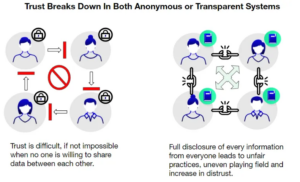
And in a way this balance of privacy and transparency to establish trust has been tipped in favor of one side to another throughout history. How many times have you or someone you know been burned by giving trust to someone who–knowingly or unknowingly–betrayed it? How many deals are broken between companies? How many government secrets have been compromised through leaks? Building trust is a gradual process, where one party shares something in hopes that the other party shares something of equal value.
But what if there was a way to share information without sharing information?
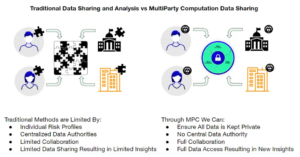
As we reviewed in other articles, multiparty computation allows for the computing of data even if the owner does not share the details around it. And in the example of sharing of data, this means any mutually distrustful parties can collectively allow the use of their data without sharing the details of data itself.
What does this mean in practice? At a high level, this means you can now reduce the weight of risk in the balance of establishing trust. Because you no longer have to expose your private data, the risk of that data being used against you is lowered. And this means you no longer require the same heavy weight for demonstrated reliability that you would need on the other side of the trust scale.
This is a game changer on many levels. Trust is the fundamental basis for any relationships between entities. With MPC, we now have the opportunity to change how this can be played.
In the example below, let’s say we have two financial companies that are competitors. They have a lot of secrets they would like to keep internal, but they do business with each other as a part of their overall practice. As a result of their business, there are many mutual clients. If there was a suspicious activity in one of their clients, having a single set of data they can analyze may not be enough. But what if both companies could share the use of their data together for forensic analysis without sharing the details of the data itself? This may lead to a far more comprehensive analysis.
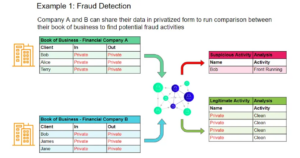
Another example is where multiple companies need to validate meeting of certain regulatory or compliance goals. But to compute the data, it requires exposing private information. Through MPC and Partisia Blockchain, a company will be able to validate meeting regulatory goals without exposing their data to the public.
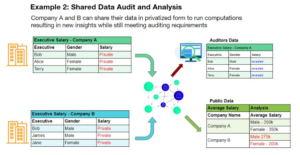
These are very simple examples of how companies can still work together without revealing their private data. And we have quite a variety of projects building on Partisia Blockchain that takes advantage of this new way of doing business.
CyberPeace Institute is working with Partisia Blockchain to help NGOs combat the issue of malware and ransomware by allowing NGOs to privately work with other parties who may be facing similar attacks. This allows NGOs to work together with others without reputation impact or exposing information that may create other vulnerabilities in their system.
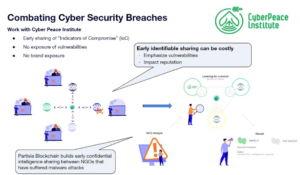
Monadi is working on helping companies comply with CSRD regulations that will impact over 50,000 companies in the EU. By 2025, companies will need to validate that they are meeting certain SDG goals, with the first goal being able to certify that there is no gender pay gap in their executives’ compensations. As the regulation matures, Monadi will be in a good position to help companies certify other SDG requirements without the need for the company to expose private data.
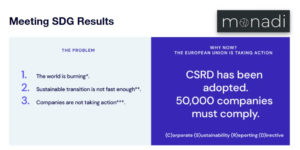
With a growing number of partners and integrators looking to solve the issue of trust, Partisia Blockchain is well positioned to help provide the solutions we need–whether it is to address the transparency in blockchains or to solve existing problems outside the blockchain space.
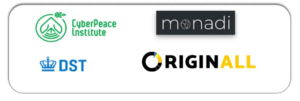
For additional insights on this use case, come and watch our Q&A session we did on this topic.
By creating a programming language that allows for developers to use MPC in a generic way, Partisia Blockchain Foundation has made the creation of applications that can harness the power of MPC for different use cases a possibility. Partisia has been at the forefront of providing private MPC solutions since 2008. And by layering this technology on top of an interoperable and scalable blockchain, Partisia Blockchain is now paving the way for anyone to create solutions that can balance privacy and transparency to build trust.
To learn more about different use cases or partner with us for solutions, please visit partisiablockchain.com, check out our Medium articles, development documentations or email us at build@partisiablockchain.com.
Ledgers are the primary ways settlements are recorded. The first double bookkeeping ledger system was recorded in use as far back as the 1300s. It is still the de-facto system used today to record transactions between entities.
Fast forward to 2008. Satoshi Nakamoto (pseudonym) was frustrated with the corruption due to the lack of transparency and centralized control of the traditional system. He proposed a transparent distributed ledger system that was immutable as a system of recording transactions. Thus Bitcoin was born.
But with all new systems, there is always room for improvements.
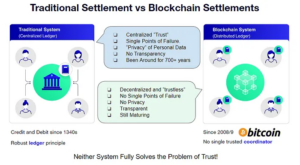
As discussed in our previous articles, full transparency does not solve the problem of building trust. In fact, privacy is a requirement in any trust relationship. For example, nobody would trust a credit card provider that revealed every purchase cardholders made just by someone having their credit card number. In a traditional blockchain space, every transaction is written in a public ledger. It would only require matching a wallet address to a name to see the full history of their transactions.
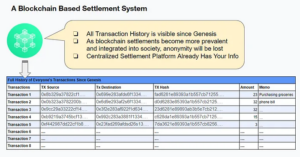
How can you have a blockchain that privatizes transactions and has enough flexibility to analyze and compute the data? Through integrating a proven technology into a scalable and interoperable blockchain.
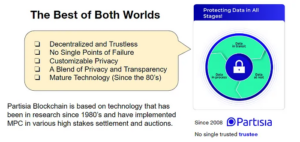
Developers can pick and choose which part of the data in the blockchain needs to be private and which can be public. All thanks to the Partisia Blockchain’s programmable MPC. A layer of governance can be enabled around the private data to allow for computation and access to select individuals. Those who access the data can also be audited transparently.
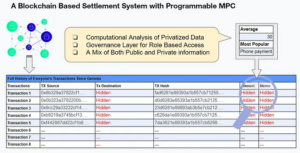
Now, even if someone has your credit card details, they will not be able to see your purchase history and your spending. If needed, a governance model can be created to ensure auditability and traceability to the system.
The importance is evident in our partnership with the International Committee of the Red Cross (ICRC). We partnered with the ICRC to build out a program for distributing aid through blockchain. One of their key requirements was privacy of the aid recipients. As they are a very unique organization, one of their key principles is in confidentiality and bilateral dialogue. The ICRC mainly operates in conflict zones and lack of privacy can mean life or death.
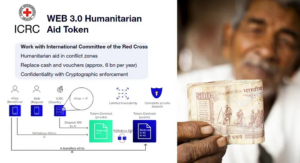
ICRC was able to solve their key challenge of privatizing the transactions of the stable tokens in the ecosystem thanks to Partisia Blockchain’s MPC. As shown above, the deposit of the funds from ICRC is kept private. As a result, transfers between the users are anonymous. To learn more, please watch our video of the overview of the solution here.
As blockchains become more prevalent, the need for privacy will continue to grow and take center stage. Various projects are already being built with private settlements in mind. We continue to speak with many organizations who prioritize the need for privacy in a blockchain solution.
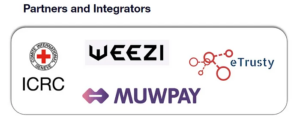
For additional insights on this use case, come and watch our Q&A session we did on this topic.
By creating a programming language that allows for developers to use MPC in a generic way, Partisia Blockchain Foundation has made the creation of applications that can harness the power of MPC for different use cases a possibility. Partisia has been at the forefront of providing private MPC solutions since 2008. And by layering this technology on top of an interoperable and scalable blockchain, Partisia Blockchain is now paving the way for anyone to create solutions that can balance privacy and transparency to build trust.
To learn more about different use cases or partner with us for solutions, please visit partisiablockchain.com, check out our Medium articles, development documentations or email me at bruce.ahn@partisiablockchain.com.